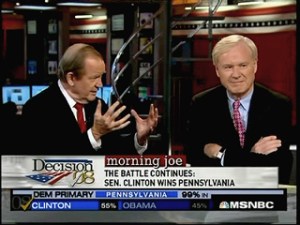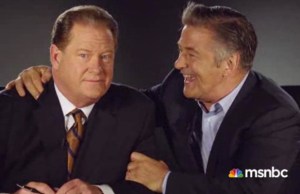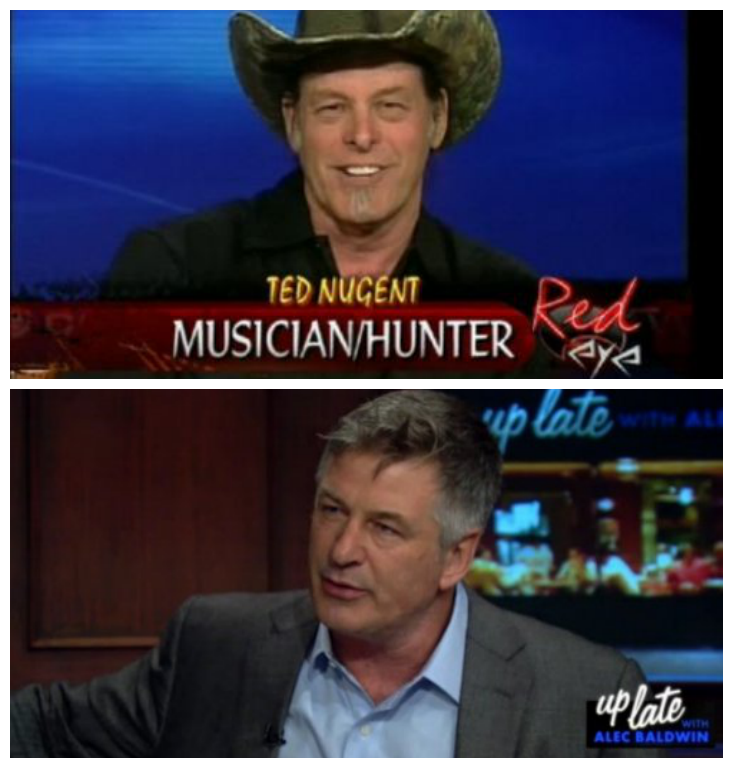Ted Nugent called President Obama a “subhuman mongrel.” “That’s just Ted,” said Texas Governor Rick Perry. Conservatives circled the wagons around Nugent before he finally apologized.
Videos by Rare
Alec Baldwin called a photographer a “c**ksucking f*g!” Geraldo Rivera said it wasn’t a homophobic slur because, “Sean (Hannity), Baldwin and I all grew up within ten miles of each other and when we were growing up, in my year especially, those comments were commonplace.” “Stop, everybody, being so damn uptight,” said Joan Rivers about her friend Alec.
MSNBC’s Ed Schultz called conservative radio host Laura Ingraham a “talk slut.” CNN anchor Randi Kaye defended Schultz saying “there are mixed interpretations about the word.” Schultz eventually apologized.
When MSNBC’s Martin Bashir suggested someone should defecate and urinate on Sarah Palin, CNN anchor Chris Cuomo defended Bashir, saying “Do you think Martin Bashir was trying to be viciously, savagely hurtful to Sarah Palin?” Bashir eventually resigned.
Coming full circle, Palin defended Nugent last week after his controversial comments came to light, saying of Texas gubernatorial candidate Greg Abbott, “If he is good enough for Ted Nugent, he is good enough for me!”
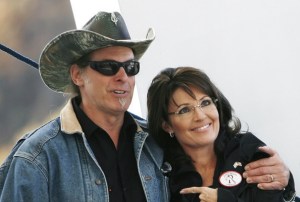
Why do some conservatives and liberals seem to tolerate intolerance when it comes from fellow conservatives and liberals?
Because they know them.
Are we to believe that Republicans like Rick Perry, who were somewhat dismissive of Nugent’s racist comments at first, agree with those comments? Did Geraldo really think it was acceptable to make anti-gay slurs? Do CNN anchors really think its OK to call women “sluts” or to poop on Sarah Palin? Does Palin really think it’s all right to call the president subhuman?
Probably not. But they also don’t think it’s OK for anyone to gang up on their friends, acquaintances or allies. That commonality or loyalty comes first, usually as a gut reaction, before their consideration of offensive comments or actions, no matter how vile or outrageous.
Their first instinct is to protect their own. It’s emotion, not logic.
It’s also pretty universal.
When Senator Rand Paul says Democrats should disown “repetitive sexual predator” Bill Clinton, liberals are dismissive. When liberals point out that Ted Nugent is a repetitive sexual predator, conservatives are dismissive.
Why? Because liberals like Bill Clinton and conservatives like Ted Nugent. They don’t want to hear it. Nobody’s perfect.
Indeed, popular or powerful people can get away with all sorts of things that could damage the reputations of those less known. I should know.
Bill Clinton said this about Barack Obama during the 2008 campaign: “A few years ago, this guy would have been getting us coffee.” This is a fairly racist statement. Still, Clinton has the highest favorability of any living ex-president.
Is America rabidly racist? Or do they just really like Bill Clinton?
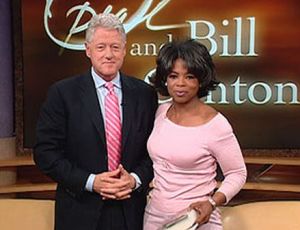
Is what Clinton said really any less reprehensible than what got Duck Dynasty’s Phil Robertson into trouble? Robertson said of homosexuals, “It seems like, to me, a vagina — as a man — would be more desirable than a man’s anus,” His oldest son, Alan Robertson defended, saying, “Dad is a good, solid Bible man, and so are the rest of us.”
Robertson defended his dad because… well, it’s his dad.
But perhaps more illuminating, why did millions of Americans rush to Robertson’s defense? Was this some mass expression of homophobia? Or was it the fact that so many Americans felt they knew this man from his television show and believed he was a better person than how he was being portrayed?
Did they defend him simply because they liked him, despite his controversial comments? In the same way so many like Bill Clinton despite his controversial past?
Did millions of Americans perhaps know family, friends and neighbors, who were also decent people despite holding views that were just as outside the mainstream as Robertson’s?
America is diverse, even in our extremes.
In 2008, when it was discovered that Barack Obama’s pastor Jeremiah Wright had said “God damn America!” and accused the United States of behaving like terrorists in the wake of 9/11, Senator Obama said, “I don’t think my church is actually particularly controversial” adding that Rev. Wright “is like an old uncle who says things I don’t always agree with.”
Yahoo! Answers user “Darren” said Phil Robertson, “reminded you of an old uncle that you might like and is good for a laugh, but one you shouldn’t take too serious.”
As the Wright controversy grew, Obama delivered a speech in which he defended his two decades of attending Wright’s Trinity United Church of Christ by saying, “The church contains in full the kindness and cruelty, the fierce intelligence and the shocking ignorance, the struggles and successes, the love and, yes, the bitterness and biases that make up the black experience in America.”
Obama was saying that as extreme as Wright’s language was, such rhetoric represented a particular American experience others might not readily understand. Obama concluded, “These people are a part of me. And they are a part of America, this country that I love.”
The New York Times’ Jodi Kantor wrote of Obama’s speech, “Presidential politics usually requires candidates to either wholly adopt or reject positions and people. Mr. Obama did neither with his pastor, rejecting his most divisive statements but also filling in the picture of Mr. Wright and his church.”
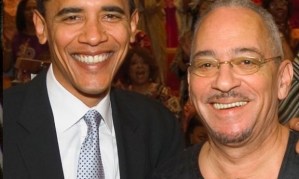
Americans should continue to reject divisive or hateful statements, from Ted Nugent, Alec Baldwin, Phil Robertson, Bill Clinton, Jeremiah Wright and anyone else.
But we also shouldn’t feign surprise or shock when these figures aren’t simultaneously expelled from polite society or their respective political movements.
We have all been tolerant of offensive behavior of some sort, knowingly or not, and usually depending on our party, who we like, who we don’t, who stands to benefit and what level of hypocrisy we are willing to endure.
MSNBC’s Chris Matthews said last week regarding Republicans and Ted Nugent, that “you are known by the company you keep.” Matthews’ apparently forgets that his network was once home to Martin Bashir and still hosts Ed Schultz.
Then again, Matthews knows Bashir and Schultz. He also knows Pat Buchanan, who left MSNBC in 2012 over controversial racial statements made in his book. Matthews said on the day Buchanan left, “He’s leaving the network and won’t be working with us from now on. I miss him already.”
Concluded Matthews, “Pat sticks up for his people like nobody I know. He’ll laugh with you about the frailties and foibles of those he served but he never, ever quits being loyal to them.”
Chris Matthews doesn’t agree with Pat Buchanan about anything. But he knows him.
For most people, that’s enough.

